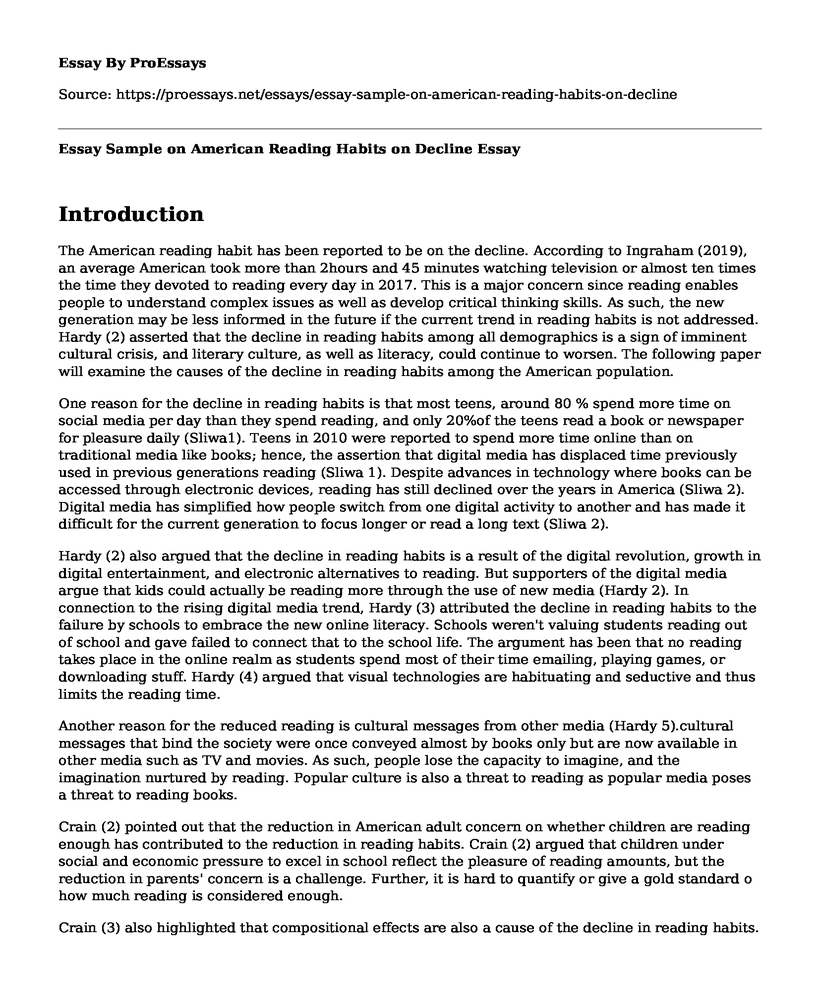Introduction
The American reading habit has been reported to be on the decline. According to Ingraham (2019), an average American took more than 2hours and 45 minutes watching television or almost ten times the time they devoted to reading every day in 2017. This is a major concern since reading enables people to understand complex issues as well as develop critical thinking skills. As such, the new generation may be less informed in the future if the current trend in reading habits is not addressed. Hardy (2) asserted that the decline in reading habits among all demographics is a sign of imminent cultural crisis, and literary culture, as well as literacy, could continue to worsen. The following paper will examine the causes of the decline in reading habits among the American population.
One reason for the decline in reading habits is that most teens, around 80 % spend more time on social media per day than they spend reading, and only 20%of the teens read a book or newspaper for pleasure daily (Sliwa1). Teens in 2010 were reported to spend more time online than on traditional media like books; hence, the assertion that digital media has displaced time previously used in previous generations reading (Sliwa 1). Despite advances in technology where books can be accessed through electronic devices, reading has still declined over the years in America (Sliwa 2). Digital media has simplified how people switch from one digital activity to another and has made it difficult for the current generation to focus longer or read a long text (Sliwa 2).
Hardy (2) also argued that the decline in reading habits is a result of the digital revolution, growth in digital entertainment, and electronic alternatives to reading. But supporters of the digital media argue that kids could actually be reading more through the use of new media (Hardy 2). In connection to the rising digital media trend, Hardy (3) attributed the decline in reading habits to the failure by schools to embrace the new online literacy. Schools weren't valuing students reading out of school and gave failed to connect that to the school life. The argument has been that no reading takes place in the online realm as students spend most of their time emailing, playing games, or downloading stuff. Hardy (4) argued that visual technologies are habituating and seductive and thus limits the reading time.
Another reason for the reduced reading is cultural messages from other media (Hardy 5).cultural messages that bind the society were once conveyed almost by books only but are now available in other media such as TV and movies. As such, people lose the capacity to imagine, and the imagination nurtured by reading. Popular culture is also a threat to reading as popular media poses a threat to reading books.
Crain (2) pointed out that the reduction in American adult concern on whether children are reading enough has contributed to the reduction in reading habits. Crain (2) argued that children under social and economic pressure to excel in school reflect the pleasure of reading amounts, but the reduction in parents' concern is a challenge. Further, it is hard to quantify or give a gold standard o how much reading is considered enough.
Crain (3) also highlighted that compositional effects are also a cause of the decline in reading habits. For instance, as people enter the workforce, their leisure time is reduced, which consequently reduces their reading time. Digital media and television remain the primary force that is distracting the population from books (Crain 6).
Conclusion
In conclusion, it is interesting to find that almost all research findings indicate the change in technology as a driving force for the reduction in reading habits. Much of the reading time has now been substituted by tempting technology, which is difficult to move away from as it is distracting, entertain, and readily available.
Works Cited
Crain, Caleb. "Why We Don't Read, Revisited." The New Yorker, 14 June 2018, https://www.newyorker.com/culture/cultural-comment/why-we-dont-read-revisited.
Hardy, Lawrence. "Forgetting How to Read, or Just Re-Locating It?" Education Digest, vol. 70, no. 6, Feb. 2005, pp. 33-41. EBSCOhost, search.ebscohost.com/login.aspx?direct=true&db=tfh&AN=16094960&site=eds-live&scope=site.Ingraham, Christopher. "Analysis | Leisure Reading in the U.S. Is at an All-Time Low." The Washington Post, 27 Apr. 2019, https://www.washingtonpost.com/news/wonk/wp/2018/06/29/leisure-reading-in-the-u-s-is-at-an-all-time-low/.
Sliwa, Jim. "Teens Today Spend More Time on Digital Media, Less Time Reading." American Psychological Association, 28 Aug. 2018, https://www.apa.org/news/press/releases/2018/08/teenagers-read-book.
Cite this page
Essay Sample on American Reading Habits on Decline. (2023, Mar 02). Retrieved from https://proessays.net/essays/essay-sample-on-american-reading-habits-on-decline
If you are the original author of this essay and no longer wish to have it published on the ProEssays website, please click below to request its removal:
- Paper Example on Chaining to Teach a Functional Self-Help Skill to a Child With Autism
- My Biography as a Marriage and Family Therapy Paper Example
- My Biggest Concern with the Lottery System - Essay Sample
- Essay Example on Teen Identity Formation: Exploring Music and Collective Identity
- Essay Sample on Gaining Life Skills Through College: A Positive Experience
- Essay Example on Data Literacy: Propelling Workforce to Success
- Teaching English in German Secondary Schools: Didactic Methods & Challenges - Essay Sample







